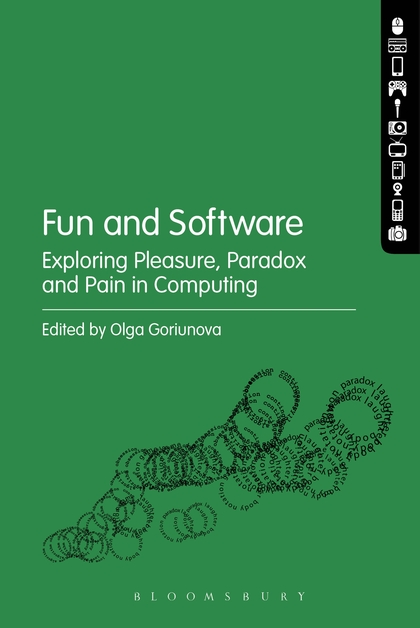Olga Goriunova (ed.): Fun and Software: Exploring Pleasure, Paradox and Pain in Computing (2014)
Filed under book | Tags: · abstraction, aesthetics, affect, algorithm, art, body, code, computing, game, humour, labour, logic, media, media theory, politics, programming, software, software art, software studies, theory, time

“Fun and Software offers the untold story of fun as constitutive of the culture and aesthetics of computing. Fun in computing is a mode of thinking, making and experiencing. It invokes and convolutes the question of rationalism and logical reason, addresses the sensibilities and experience of computation and attests to its creative drives. By exploring topics as diverse as the pleasure and pain of the programmer, geek wit, affects of play and coding as a bodily pursuit of the unique in recursive structures, Fun and Software helps construct a different point of entry to the understanding of software as culture. Fun is a form of production that touches on the foundations of formal logic and precise notation as well as rhetoric, exhibiting connections between computing and paradox, politics and aesthetics. From the formation of the discipline of programming as an outgrowth of pure mathematics to its manifestation in contemporary and contradictory forms such as gaming, data analysis and art, fun is a powerful force that continues to shape our life with software as it becomes the key mechanism of contemporary society.”
Texts by Andrew Goffey, Simon Yuill, Matthew Fuller, Luciana Parisi and M. Beatrice Fazi, Adrian Mackenzie, Michael Murtaugh, Geoff Cox and Alex McLean, Wendy Hui Kyong Chun and Andrew Lison, Christian Ulrik Andersen, Brigitte Kaltenbacher, Annet Dekker, and Olga Goriunova.
Publisher Bloomsbury, New York and London, 2014
New Media and Technology series
ISBN 1623560942, 9781623560942
285 pages
Software studies page on Monoskop
Comment (0)Computational Culture, a Journal of Software Studies, Issue Four (2014)
Filed under journal | Tags: · computing, database, facebook, filesharing, networks, social media, software, software studies
“What marks much of the work presented in this issue of Computational Culture is its endeavour to pay more analytically precise attention to socio-technical formatting of the present, based on a common assumption that the specificities of computational forms are fundamentally constitutive of that present.” (from the Editorial)
With articles by Paul Dourish, Irina Kaldrack and Theo Röhle, Benjamin Grosser, Dennis Tenen and Maxwell Foxman, Alex Taylor, Jasmin Fisher, Byron Cook, Samin Ishtiaq; comments by Geert Lovink, Mark Marino; and a review section.
Editorial group: Matthew Fuller, Andrew Goffey, Olga Goriunova, Graham Harwood, Adrian Mackenzie
Published in November 2014
Open Access
ISSN 2047-2390
Alessandro Delfanti: Biohackers: The Politics of Open Science (2013)
Filed under book | Tags: · biology, capitalism, code, commons, diy biology, freedom, gift economy, hacker culture, hacker ethic, hacking, information, intellectual property, open science, open source, science, software, technology

“Biohackers explores fundamental changes occuring in the circulation and ownership of scientific information. Alessandro Delfanti argues that the combination of the ethos of 20th century science, the hacker movement and the free software movement is producing an open science culture which redefines the relationship between researchers, scientific institutions and commercial companies.
Biohackers looks at the emergence of the citizen biology community ‘DIYbio’, the shift to open access by the American biologist Craig Venter and the rebellion of the Italian virologist Ilaria Capua against WHO data-sharing policies.
Delfanti argues that these biologists and many others are involved in a transformation of both life sciences and information systems, using open access tools and claiming independence from both academic and corporate institutions.”
Publisher Pluto Press, London, 2013
Creative Commons Attribution-NonCommercial-NoDerivs 3.0 License
ISBN 9781849649070
176 pages
Review (Alice Bell, The Guardian, 2013)
Review (Stefano Golinelli and Luc Henry, Science, 2014)
EPUB
PDF (added on 2018-10-17)
Issuu

